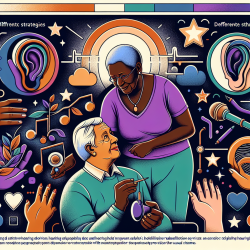As a practitioner in the field of audiologic rehabilitation, it's essential to stay updated with the latest research and implement strategies that can improve outcomes for your clients. The research article "Audiologic Rehabilitation Needs of Older Adults with Hearing Loss: Views on Assistive Technology Uptake and Appropriate Support Services" by Mary Beth Jennings provides valuable insights into the challenges and needs of older adults with hearing loss. Here are five key strategies derived from the research to help you enhance your practice:
1. Increase Awareness and Early Identification
Older adults often delay acknowledging their hearing loss due to its gradual onset and societal stigmas. As a practitioner, you can play a crucial role in increasing awareness about the importance of early identification and intervention. Conduct community outreach programs and workshops to educate both older adults and their families about the signs of hearing loss and the benefits of early treatment.
2. Address Physical and Emotional Barriers
Many older adults face physical challenges, such as reduced manual dexterity and vision problems, that make handling hearing aids difficult. Additionally, emotional barriers like stigma and denial can prevent them from seeking help. Offer comprehensive assessments that consider these factors and provide tailored solutions, such as larger controls on hearing aids and counseling services to address emotional concerns.
3. Provide Comprehensive Follow-Up and Support
Successful audiologic rehabilitation requires ongoing support. Ensure that your clients receive regular follow-up appointments to address any issues with their hearing aids and to reinforce the benefits of using assistive technology. Encourage participation in support groups where they can share experiences and strategies with peers, which can significantly enhance their adaptation process.
4. Promote the Use of Assistive Technologies
Despite the availability of assistive technologies, many older adults do not use them due to lack of awareness or perceived stigma. Highlight the benefits of these technologies in improving quality of life and independence. Demonstrate how devices like amplified telephones, visual alert systems, and assistive listening devices can make daily activities easier and safer.
5. Advocate for Policy Changes and Education
Advocate for better policies and increased funding for audiologic rehabilitation services. Educate healthcare providers, government agencies, and insurance companies about the importance of comprehensive hearing care for older adults. By raising awareness and pushing for systemic changes, you can help reduce barriers to accessing necessary services.
Implementing these strategies can significantly improve the outcomes for older adults with hearing loss. By staying informed and proactive, you can make a meaningful difference in their lives.
To read the original research paper, please follow this link: Audiologic Rehabilitation Needs of Older Adults with Hearing Loss: Views on Assistive Technology Uptake and Appropriate Support Services










